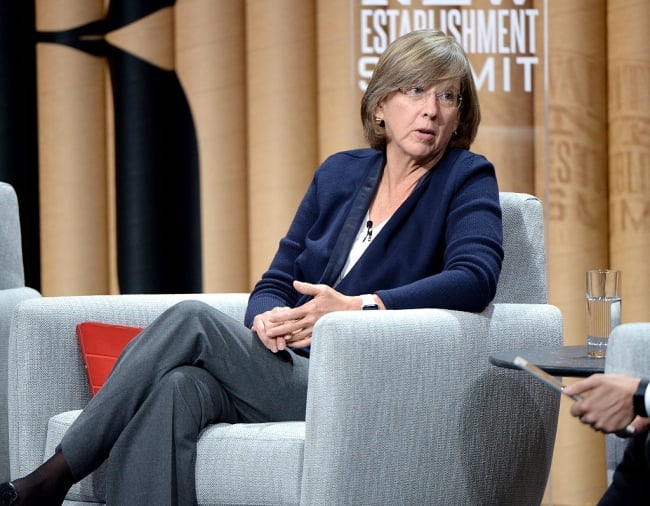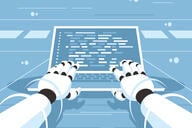You have /5 articles left.
Sign up for a free account or log in.

Tech analyst and venture capitalist Mary Meeker is focusing on higher ed and AI in her new report.
Michael Kovac/Getty Images for Vanity Fair
Universities require a “mindset change” to succeed in a coming era forged by artificial intelligence and should take on an AI leadership role in partnership with government and tech firms, according to a report from an influential tech analyst and venture capitalist.
Mary Meeker, founder and general partner at Bond Capital, became known as the “queen of the internet” for her analysis of internet stocks. Her in-depth annual internet trends report was a must-read for Silicon Valley until the last one in 2019.
Meeker’s “AI & Universities,” her first report in more than four years, centers on the intersection of higher education and artificial intelligence.
“In the wake of ChatGPT and the AI explosion, we have likely reached a generational, fast and furious change across education,” Meeker writes in the 17-page report released last week. “The ramp in artificial intelligence—which leverages the history of learning for learning—affects all forms of learning, teaching, understanding, and decision making. This should be the best of times.”
Meeker said, “Actions taken in the next five years will be consequential” and American higher ed institutions, which she called “bastions of technological progress,” should take leadership roles, in combination with industry and government. She said universities also need to remake themselves to succeed.
“Universities need to find, create, and sustain their differentiators—their best-in-class programs and advantages that attract students—or risk losing market share in an increasingly transparent and AI-enabled world that has already received a COVID-related remote work booster,” she said. “The reality is that younger students (and lifelong learners) are getting smarter about their learning options, costs, and returns. They will be aggressive voters with their time and money.”
Meeker’s comments were welcomed by Bridget Burns, CEO at the University Innovation Alliance. However, Burns said, the change needs to go further.
“It’s a yes, and—we need to collaborate with higher education but also within higher education” she said. “[Meeker] talks about differentiation in the market, but if you want to unleash human potential at scale, you need to see universities team up on leveraging AI so we’re not just getting 4,000 different versions of how we’re going to do things.”
Meeker pointed toward many of the changes that have occurred at universities, including Arizona State University, the Georgia Institute of Technology and the Massachusetts Institute of Technology. They have expanded their digital offerings, moving toward the potential use of AI as a personalized tutor.
“The advance of AI should drive the fastest and biggest transformations, disruptions and platform shifts in technology ever seen,” she said, adding the industry has more data—and more access to data—than ever before, and this cycle of innovation is set to emerge faster than ever.
She added that the evolution of learning, coupled with the quick adoption of AI, could drive institutions to look toward alumni and students as “customers.”
“To maintain academic relevance and market share, many universities require a mindset change,” she said. “The key for universities today, we believe, will be creating education as a service and generating [return on investment] for student customers while building best-in-class programs with differentiated teachers in a win-win environment.”
Burns lauded the use of the word “customers,” which she acknowledged is “taboo,” but she said it is a push in the right direction of more personalized learning.
“I think it’s super important to prioritize understanding our students’ experience and leveraging technology to ensure we’re providing the supports needed,” she said. “I think this orientation toward a customer focus is critical.”
However, Meeker’s strategy did not sit well with everyone. Anna Ivey, an admissions consultant and former dean of admissions at the University of Chicago Law School, laughed out loud in a San Francisco Starbucks upon reading parts of the report.
A self-described member of the “skeptical camp” regarding AI, she was concerned upon seeing Meeker state that using AI could help equip students for higher education and workforces that rely on communication.
“From my little perch where I work directly with students, I’ve already observed a dramatic drop-off in communication skills—both written and oral—thanks to the internet and ed tech,” she said. “I can only see AI making this worse.”
Ivey did agree with Meeker’s recommendation on leveraging AI for rudimentary tasks, believing that time can be freed up for other tasks that need human intervention.
Meeker suggested using AI for course development and personalized learning plans and for grading, classroom management and administrative support.
“In the basics of teaching—from drafting lesson plans to reviewing assignments and managing classroom communications—teachers already have a full plate,” she said. “As technology evolves and becomes more widely available, teachers should be able to save time and increase productivity, focusing more on their core craft by leveraging AI for more time-intensive tasks.”
Meeker’s other recommendations include universities staying current by keeping an eye on AI trends, potentially with a group similar to the AI Acceleration team at ASU.
“We are at the beginning of a new supercycle,” she said. “At its essence, greatness begets greatness in the right setting, with the right people (and leadership), with the right resources at the right time and focus, focus, focus.”




